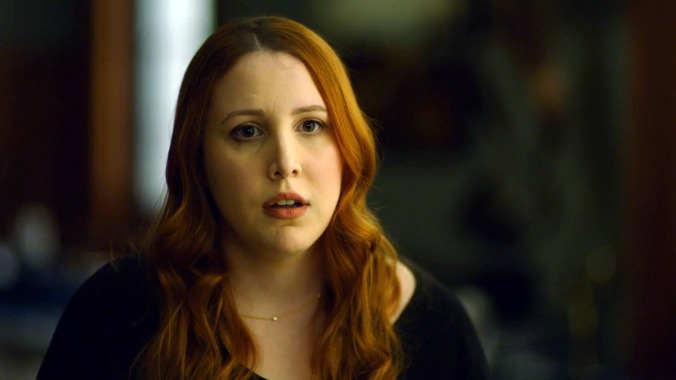Dylan Farrow’s voice rises above the media circus in HBO’s Allen V. Farrow

HBO’s Allen V. Farrow is an overwhelming documentary series; its emotional intensity should come with a trigger warning. The docuseries scrutinizes the sexual abuse allegations against Oscar-winning director Woody Allen made by adoptive daughter Dylan Farrow in 1992, when she was only 7. This case has been excessively covered by the media for decades now, but Allen V. Farrow attempts to go beyond headlines by featuring intimate interviews with Dylan, her mother Mia Farrow (Allen’s former partner), brothers Ronan and Fletcher Farrow, as well as other family friends, witnesses, experts, journalists, and investigators. For the most part, the docuseries is a powerful venture. It gives Dylan a safe space to recount traumatic experiences, goes down the rabbit hole of the Farrow-Allen custody battle, and uncovers more about Allen’s marriage with Mia’s adopted daughter Soon-Yi Previn. Most importantly, it acts as a damning mirror for the society that let Allen thrive after the allegations became a major public scandal.
An excessive amount of time is spent charting Allen’s rise into a massively popular figure in New York City and the entertainment industry. In the larger overview of the series, perhaps this helps offer some insight into how he was able to overcome the severity of the allegations to continue winning awards and making films with famed actors. But some inclusions seem superfluous, including a particular analysis of Allen’s movies like 1979’s Manhattan, and how they fixated on his older character romancing younger women. It’s a critical point—perhaps enough to make a wholly separate journalistic project—but here it feels a bit ham-fisted, especially for viewers already familiar with Allen’s body of work.
But Allen V. Farrow is still a riveting and often difficult watch. It’s on track with filmmakers Amy Ziering and Kirby Dick’s previous documentaries, from 2012’s The Invisible War, which examined sexual assault in the U.S. military, to 2020’s On The Record, one of the most thorough examinations of the sexual harassment allegations against hip-hop mogul Russell Simons. The filmmakers, including Amy Herdy, spent four years researching the series, and it shows. Allen V. Farrow frames its narrative using reams of legal documents, previously unseen footage, and witness interviews. There are lots of videos from Dylan’s childhood, which show her playing with Allen in the pool, hanging out at home, and traveling across the world with other siblings. The footage paints a picture of a supposedly happy time but, as Dylan says in her interview, there was allegedly more to it than meets the eye.
Allen V. Farrow somewhat follows a chronological order, with the first couple of episodes tracking the growth of Allen and Mia Farrow’s careers, relationship, and family. Mia, who hasn’t spoken too much publicly in several years, reflects on her relationship with Allen, calling him her biggest regret. “It’s my fault. I brought this guy into our family. There’s nothing I can do to take that away,” Farrow says. In one agonizing scene, she describes the day she found revealing Polaroids of her daughter Soon-Yi in Allen’s apartment, when all hell finally broke loose.
The documentary goes on to provide granular details of the custody battle, as well as the police investigations against Allen in the states of New York and Connecticut. Throughout their custody trial and in media appearances (included in clips), Allen claimed that Mia coached Dylan to lie. He tried to paint his ex as a woman scorned, an incredibly resonant example of gaslighting. Allen, Previn, and Moses, his adoptive son with Mia, declined to be interviewed for the docuseries. Moses is the only member of the large family who has gone on record to side with his father. Allen’s appearances in Allen V. Farrow are largely through secretly taped phone calls between him and Mia and audio clips from his 2020 audiobook, Apropos Of Nothing. The documentary looks at the flawed manner in which the Yale New Haven Clinic conducted Dylan’s post-allegations evaluation. Frank Maco, the investigating prosecutor at the time, is also interviewed. It was his decision that kept the case from being tried, because he did not think Dylan was in the state to testify. No criminal charges were ever filed against Allen.
The emotional anchor of Allen V. Farrow is Dylan, who finally gets to patiently tell her story. It’s wrenching to watch her recount the traumas she experienced from a very young age, starting with Allen’s possessiveness over her (corroborated here through interviews with different people: babysitters, a tutor, siblings, family friends, her mother). At one point, she has a visceral physical reaction akin to a panic attack while thinking about all of it. These aren’t easy things to remember, let alone talk about and be judged on by audiences. But the filmmakers do an admirable job of giving her the time and space to discuss it. The most stirring part comes from videos of Dylan as a child that Mia filmed over two days, in which she describe specifics of the sexual assault she accuses Allen of. Fair warning: The description can be graphic.
But Allen V. Farrow doesn’t want to define Dylan solely by her past. “I am tired of feeling that he matters more than me,” she says toward the end, while reflecting on why she started speaking out more at the onset of the #MeToo era. Allen V. Farrow also ends up being a scathing story about worshipping celebrities and celebrity culture which inevitably creates a landscape that impacts the delivery of justice in cases like this one. Ultimately, it’s an intriguing docuseries that will interest those invested in the case to reexamine it through the lens of four compelling, often uncomfortable episodes.